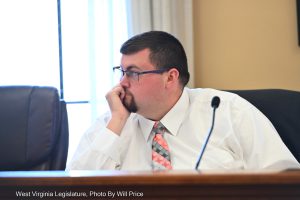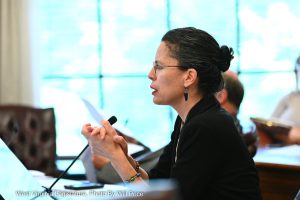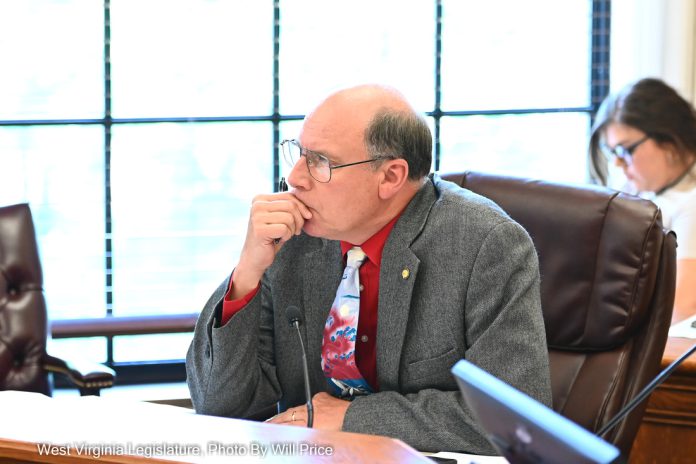The Legislative Oversight Commission of Education Accountability met on June 12, 2022. The commission heard from the Higher Education Policy Commission and the College and Technical Center Commission on the academic readiness of WV high school students. College-going rates of the class of 2020 have dropped below 50 percent. The presumption is that the COVID-19 pandemic played role in it, as it affected SAT and ACT taking and caused “zoom fatigue.” Many students wondered if it was worth it to pay for a remote college experience. Another factor in the decreased college-going rate is the opioid epidemic.
On a positive note, the average ACT score has increased in 25 counties. College going rate did increase in 20 counties. WV’s average ACT composite scores are in line with the national average. The composite scores are higher than the averages in Kentucky and Ohio.
The commission also heard an update on the Governor’s Nursing Workforce Expansion Initiative. The initiative is an investment of CARES funding. Several initiatives are happening and this update focuses on the education expansion. The funding has allowed for accelerated nursing programs and new programs, as well as prelicensure programs. Expanding enrollment has been a primary focus. Billboards were placed in areas with nursing programs, which also have fewer scholarship opportunities.
Several rules were presented to LOCEA from the HEPC, the State Board of Education, and WVSSAC.
WVHEPC, 133 SCR 12, the legislative rule extends the sunset date for capitol project management by five years from 2023.
WVHEPC, 133 SCR 42, legislative rule extended the WV Higher Education Grant program by five years.
WVHEPC, 133 SCR 55, legislative rule extended the sunset date for Human Resources Administration by five years from 2023.
Policy 1464 is the HEPC Drug-Free Workplace Policy. The changes to this policy are related to medical cannabis usage. An individual cannot be discriminated against for being a cannabis patient, however, they cannot have cannabis on school property, and they cannot be under the influence on property. CDL license holders (bus drivers) and those who must possess a firearm as part of job duties cannot test positive for cannabis under federal law. Therefore, they cannot use medical cannabis if they wish to retain these job roles.
Policy 2422.2 is the Driver Education Regulations and Restrictions Policy. The policy removes the eligibility driving certificate requirement as it is no longer necessary with the new law. Restrictions are listed for attendance and satisfactory academic progress. Exemptions are set forth to prevent restrictions relating to absences if the absences are due to circumstances beyond the student’s control.
Policy 2422.7 is the Standards for Basic and Specialized Health Care Procedures. The changes to the policy relate to student use and possession of medical cannabis in schools. Medical cannabis may be administered in schools by the caregiver. However, students cannot possess it themselves and it cannot be stored on school property. School nurses cannot administer cannabis, as it is not an FDA-approved substance.
Policy 2436.10 is the Participation in Extracurricular Activities Policy. It allows credits/grades earned from a non-public setting to be transferred to allow for academic eligibility in high school sports.
WVSSAC 127 SCR 1 amends the organization’s constitution to remove language about  collecting dues, as they haven’t been collected in over 20 years.
collecting dues, as they haven’t been collected in over 20 years.
WVSSAC 127 SCR2 are the provisions governing eligibility. Several changes were made to this section. First, it changed language relating to combining teams between middle school sports to include regional, not just counties, since some middle schools feed into a high school in another county. Middle school students have six semesters of play during middle school. This is to prevent holding students back just for athletic eligibility. International students who are not a part of a foreign exchange program will only be eligible for JV teams. This is to prevent schools from recruiting from other countries. Another change relates to an emancipated student not being recognized as a transfer. Language relating to “marriage” is removed. Non-school program participation may not take place during the school sports season. The only exemption to this is USA Swimming Junior National Championship. Middle School baseball games increased from 18 to 20, including tournaments sanctioned by WVSSAC. The number of quarters high school basketball players can play increased to six quarters in a day with the maximum in one season being 132 quarters. This does not include sectional, regional, and state tournaments. Another change includes state there is no limit to championship quarters. Another change is that homeschool families can pick a school in 6th, 7th, 8th, and 9th grade to play.
WVSSAC 127 SCR 3 are the provisions of government contests. Several changes were made, including increasing the number of all-star games allowed to be played to two. The three-week window of practice conditioning can be different for each school, instead of a set countywide schedule. All sports days of practice required to play were reduced from 14 to 12 days. A school may submit a waiver to the state school board for a classification change if it can prove that the classification fails to accomplish the purpose of the rule. The section also approved various training for coaches and requires concussion reporting. Football pre-season dates for contact/equipment levels for middle schools were set. The start date for middle school volleyball moved back.
WVSSAC 127 CSR 5 relates to the band and other activities and adds robotic activities to WVSSAC sanctioned activities.

